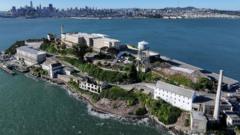South Africa grapples with the fallout of President Trump's executive order to freeze nearly $440 million in aid, ignited by the country's land reform laws and its stance against Israel. Experts warn of strained relations and the potential impact on trade as diplomatic efforts continue.
South Africa's Diplomatic Dilemma Amid US Aid Freeze

South Africa's Diplomatic Dilemma Amid US Aid Freeze
Tensions escalate between South Africa and the US as President Trump freezes aid over controversial policies.
As the diplomatic landscape shifts, South Africa finds itself navigating turbulent waters following President Donald Trump's recent decision to freeze aid to the nation. The aid freeze, amounting to nearly $440 million for 2023, follows Trump's condemnation of South African land reform policies, interpreted as unjust actions against the Afrikaner minority. This has sparked fears of deteriorating relationships, not only with the US but also a possible fallout from the Africa Growth and Opportunity Act (AGOA), which provides preferential trade access to the US market.
Historically, South Africa and the US have enjoyed a cooperative relationship since the end of apartheid, marked notably by the presidency of Nelson Mandela in 1994. However, recent tensions are exacerbated by the signing of the Expropriation Bill, which enables the government to seize land without compensation—a move criticized by Trump. His executive order invoked accusations of human rights violations and aggressive foreign policy stances, specifically regarding the genocide case against Israel.
The implications of this aid freeze are multifold, with the US embassy clarifying that while the traditional aid will face cuts, funds related to the Pepfar program—critical for South Africa's HIV response—will remain intact, albeit with limited future operations. This brings further complexity to an already precarious situation where political analysts suggest the Trump administration may view these actions as necessary leverage to discipline South Africa.
Trade between the nations could face significant challenges as well, with South African exports heavily reliant on AGOA provisions. With the upcoming review of AGOA, experts speculate that the US may prioritize punishment over partnership, leaving South Africa vulnerable in a competitive global market.
Political analysts note that, although various irritants have accumulated over time, the current US administration's aggressive stance represents an unprecedented escalation in diplomatic relations. South African officials, including President Cyril Ramaphosa, are committed to reiterating their principles despite the repercussions, signaling a willingness to persist in their legal challenges in the International Court of Justice.
In a bid to stabilize these relations, Ramaphosa has proposed sending delegations globally to clarify South Africa's policies, showcasing the nation's intent to be seen as a responsible global player. Yet, this is met with challenges as US Secretary of State Marco Rubio expressed intentions to skip major upcoming international meetings in South Africa, highlighting a growing disconnect.
In contrast, the European Union has reaffirmed its commitment to South Africa, suggesting a balancing act as the nation weighs its relationship with the US against strengthening ties with other economic partners. The complex interplay of international relations, trade dependencies, and domestic policies presents South Africa with a challenging path forward as it seeks to maneuver through these geopolitical tensions.



















